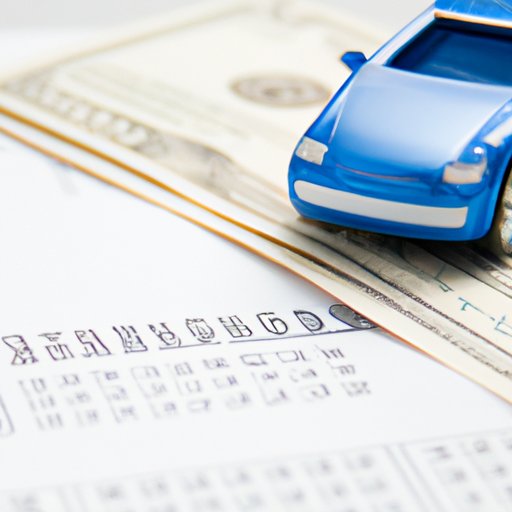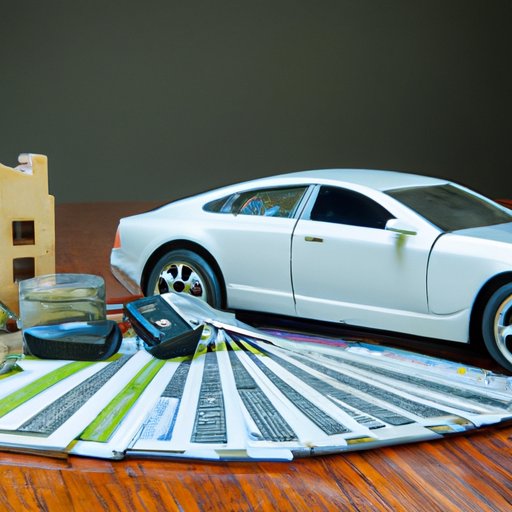Introduction
When it comes to purchasing a vehicle, most people have two main options: buy a car outright or finance it. Buying a car outright means paying for the entire price of the car up front. Financing a car involves taking out a loan from a bank or other lending institution to cover the initial purchase price. In this article, we will explore the pros and cons of these two options in order to help you make an informed decision about which one is best for you.
Comparing the Pros and Cons of Buying a Car Outright vs Financing
Let’s start by comparing the benefits and drawbacks of buying a car outright and financing a car. When it comes to buying a car outright, there are several key advantages. First, you won’t have to pay any interest charges, as you would with financing. Second, the upfront costs are usually lower than those associated with a loan. Finally, you won’t have to worry about making monthly payments, as you would with financing.
On the downside, buying a car outright can be less financially flexible than financing. You may not have enough cash on hand to cover the full cost of a vehicle. Additionally, vehicles depreciate over time, so you could end up losing money if you decide to sell your car shortly after buying it. Lastly, you may have limited options for funding the purchase, depending on your financial situation.
Financing a car also has its own set of benefits and drawbacks. One advantage of financing is that it gives you more financial flexibility. For example, you can spread the cost of the car over a longer period of time and make smaller monthly payments. Additionally, if you make all your payments on time, it can help build your credit score. And many lenders offer special deals and discounts on new cars, which can help reduce your overall cost.
The downside of financing is that you’ll have to pay interest on the loan. This can add up over time and increase the total cost of the car. Additionally, you’ll be locked into a long-term commitment, which can be difficult if your circumstances change. And, if the value of the car drops faster than the amount you still owe on it, you could end up in a situation called “negative equity”.

Exploring the Financial Implications of Purchasing a Car Outright vs Financing
When deciding whether to buy a car outright or finance it, it’s important to consider the financial implications of both options. To calculate the cost difference between the two, you’ll need to take into account the total price of the car, the interest rate, and the length of the loan term.
You should also consider the tax implications of each option. Depending on where you live, you may be able to deduct the interest paid on a car loan from your taxes. However, if you buy a car outright, you won’t be able to take advantage of this benefit.
Examining the Advantages and Disadvantages of Paying Cash for a Car vs Financing It
Another option to consider when buying a car is paying for it in cash. The primary benefit of this option is that you won’t have to pay any interest charges, as you would with financing. Additionally, the process of buying a car with cash is usually quicker than financing, since you don’t have to wait for approval from a lender.
However, there are some drawbacks to paying for a car with cash. For example, doing so can reduce the amount of liquidity you have available, as you won’t be able to use the money for other purposes. Additionally, you’ll miss out on any potential earning opportunities that the cash could have provided. Finally, if something were to happen to the car, you wouldn’t have any financial protection.

Understanding the Benefits and Drawbacks of Buying a Car in Full vs Taking Out a Loan
If you do decide to finance your car, you can choose to either buy it in full or take out a loan. Buying a car in full has several advantages. First, you won’t have to pay any interest charges, which can save you money in the long run. Additionally, the ownership transfer will be quicker, since you don’t have to wait for a loan to be approved. Finally, it can help improve your credit score, since you’ll be making a large purchase without borrowing money.
On the other hand, buying a car in full has some drawbacks. Doing so can reduce your liquidity, as you won’t be able to use the money for other purposes. Additionally, the upfront cost will be higher than if you took out a loan. Finally, you’ll be exposed to more risk, since you won’t have any financial protection if something were to happen to the car.
Analyzing the Cost-Effectiveness of Buying a Car Outright vs Financing It
In addition to the benefits and drawbacks of each option, you should also consider the cost-effectiveness of buying a car outright versus financing it. To do this, you’ll need to investigate the total cost of the car, including the initial purchase price, any financing fees, and insurance costs. You’ll also want to examine the future value of the car, as this can affect how much money you make or lose in the long run.

Investigating the Risks and Rewards of Investing in a Vehicle with Cash vs Credit
Finally, it’s important to understand the risks and rewards associated with investing in a vehicle with cash versus credit. If you finance your car, you’ll face the risk of repossession if you default on your payments. Additionally, you could lose the collateral (the car itself) if you fail to make payments. On the other hand, financing can help you build your credit history and access more attractive deals, as well as provide an opportunity for future growth.
Conclusion
Buying a car outright or financing it both have their own advantages and disadvantages. When making your decision, it’s important to weigh the financial implications of each option and consider the cost-effectiveness of the purchase. Additionally, you should be aware of the risks and rewards associated with investing in a vehicle with cash versus credit. Ultimately, the best option for you will depend on your individual needs and financial situation.
(Note: Is this article not meeting your expectations? Do you have knowledge or insights to share? Unlock new opportunities and expand your reach by joining our authors team. Click Registration to join us and share your expertise with our readers.)
